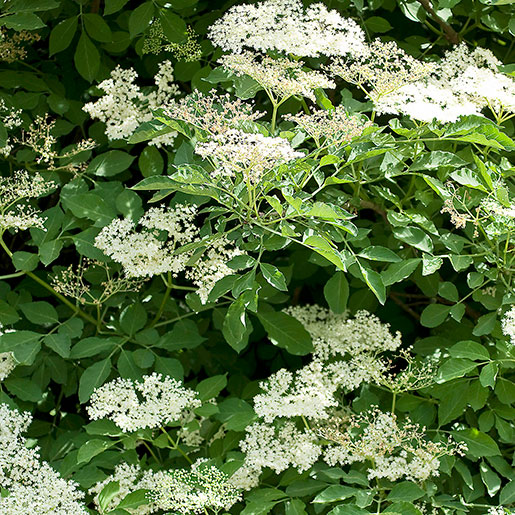Elderberry

Common Names: elderberry, black elderberry, European elder, common elder
Latin Names: Sambucus nigra
Background
- Elderberry is the dark purple berry of the European or black elder tree, which grows in Europe, North America, Western Asia, and North Africa.
- Elderberry has been used in folk medicine to treat colds and flu.
- Elderberry is promoted as a dietary supplement for colds, flu, and other conditions. It has also been promoted for COVID-19, but there is no good evidence to support its use.
How Much Do We Know?
- A small number of studies have evaluated elderberry for colds, flu, and other upper respiratory infections. Little research has been done in people on other uses of elderberry.
What Have We Learned?
- Some preliminary research suggests that elderberry may relieve symptoms of flu, colds, or other upper respiratory infections.
- The U.S. Food and Drug Administration (FDA) and Federal Trade Commission have taken action against companies that marketed elderberry products with unsubstantiated claims of effectiveness for COVID-19.
- There’s not enough information to show whether elderberry is helpful for any other health purposes.
What Do We Know About Safety?
- Raw or unripe elderberries and other parts of the elder tree, such as the leaves and stem, contain poisonous cyanide-producing substances that can cause nausea, vomiting, and severe diarrhea; cooking eliminates this toxin. Large quantities of the toxin may cause serious illness.
- If you take any type of medicine, talk with your health care provider before using elderberry or other herbal products; some herbs and medicines interact in harmful ways.
- Little is known about whether it’s safe to use elderberry for health purposes during pregnancy or while breastfeeding.
Keep in Mind
- Don’t rely on elderberry for prevention or treatment of COVID-19. There is insufficient evidence to know if it can help with symptoms.
- Take charge of your health—talk with your health care providers about any complementary health approaches you use. Together, you can make shared, well-informed decisions.
- Federal Regulation of Herbal Products
- Depending on what’s in them, how they’re intended to be used, and how they’re administered (orally or topically), herbal products are regulated in a variety of ways. Many herbal products intended for oral use are marketed as dietary supplements. The rules for making and distributing dietary supplements are less strict than those for drugs.
- Unlike drugs, dietary supplements are not approved by the FDA before they are sold to the public. When public health concerns arise about the safety of a dietary supplement or an ingredient including an herb, the FDA can take action to protect the public. Manufacturers and distributors of supplements are responsible for evaluating the safety and labeling of their products before marketing to ensure that they meet all regulatory requirements.
NCCIH Clearinghouse
The NCCIH Clearinghouse provides information on NCCIH and complementary and integrative health approaches, including publications and searches of Federal databases of scientific and medical literature. The Clearinghouse does not provide medical advice, treatment recommendations, or referrals to practitioners.
Toll-free in the U.S.: 1-888-644-6226
Telecommunications relay service (TRS): 7-1-1
Website: https://www.nccih.nih.gov
Email: info@nccih.nih.gov (link sends email)
PubMed®
A service of the National Library of Medicine, PubMed® contains publication information and (in most cases) brief summaries of articles from scientific and medical journals. For guidance from NCCIH on using PubMed, see How To Find Information About Complementary Health Practices on PubMed.
Website: https://pubmed.ncbi.nlm.nih.gov/
Office of Dietary Supplements (ODS), National Institutes of Health (NIH)
ODS seeks to strengthen knowledge and understanding of dietary supplements by evaluating scientific information, supporting research, sharing research results, and educating the public. Its resources include publications (such as Dietary Supplements: What You Need To Know) and fact sheets on a variety of specific supplement ingredients and products (such as vitamin D and multivitamin/mineral supplements).
Website: https://ods.od.nih.gov
Email: ods@nih.gov (link sends email)
Key References
- Adams KK, Baker WL, Sobieraj DM. Myth busters: dietary supplements and COVID-19. Annals of Pharmacotherapy. 2020;54(8):820-826.
- Asgary S, Pouramini A. The pros and cons of using elderberry (Sambucus nigra) for prevention and treatment of COVID-19. Advanced Biomedical Research. 2022;11:96.
- Brendler T, Al-Harrasi A, Bauer R, et al. Botanical drugs and supplements affecting the immune response in the time of COVID-19: implications for research and clinical practice. Phytotherapy Research. 2021;35(6):3013-3031.
- Crawford C, Brown LL, Costello RB, et al. Immune supplements under the magnifying glass: an expert panel develops priorities and evidence-based recommendations for future research regarding dietary supplements. Journal of Integrative and Complementary Medicine. 2023;29(4):261-267.
- Elderberry. NatMed Pro website. Accessed at naturalmedicines.therapeuticresearch.com on January 29, 2024. [Database subscription].
- Harnett J, Oakes K, Carè J, et al. The effects of Sambucus nigra berry on acute respiratory viral infections: a rapid review of clinical studies. Advances in Integrative Medicine. 2020;7(4):240-246.
- Hawkins J, Baker C, Cherry L, et al. Black elderberry (Sambucus nigra) supplementation effectively treats upper respiratory symptoms: a meta-analysis of randomized, controlled clinical trials. Complementary Therapies in Medicine. 2019;42:361-365.
- Saifulazmi NF, Rohani ER, Harun S, et al. A review with updated perspectives on the antiviral potentials of traditional medicinal plants and their prospects in antiviral therapy. Life (Basel). 2022;12(8):1287.
- Sandu-Bălan Tăbăcariu A, Ifrim I-L, Patriciu O-I, et al. Walnut by-products and elderberry extracts-sustainable alternatives for human and plant health. Molecules. 2024;29(2):498.
This publication is not copyrighted and is in the public domain. Duplication is encouraged.
NCCIH has provided this material for your information. It is not intended to substitute for the medical expertise and advice of your health care provider(s). We encourage you to discuss any decisions about treatment or care with your health care provider. The mention of any product, service, or therapy is not an endorsement by NCCIH.